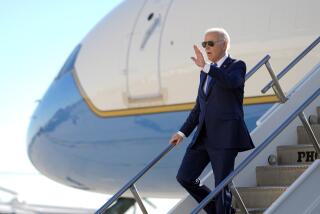Rice and Tenet to Be Quizzed Again on 9/11
- Share via
WASHINGTON — With weeks of high-drama public hearings behind it, the commission investigating the Sept. 11 attacks plans a final round of private questioning for CIA Director George J. Tenet and national security advisor Condoleezza Rice before preparing its final report on the attacks, due next month, commission members said Friday.
The nature of the questioning was not known, although Tenet and Rice have been central figures in the story line surrounding the attacks and the ensuing investigation and have previously testified before commission hearings.
The CIA director, who has resigned effective July 11, has borne the brunt of criticism from the commission for intelligence breakdowns preceding the attacks. He has also criticized one of the intelligence reforms that the commission is said to be considering -- the creation of an independent domestic spy service.
Rice has been a point person in defending the Bush administration against some commission members’ charges that the administration failed to seriously address the Al Qaeda threat during its first eight months.
“We have some additional investigative work including interviews to follow up on. The two most obvious are Director Tenet and Dr. Rice, where there are still some outstanding questions,” said commission member Richard Ben-Veniste, a former Watergate prosecutor.
The commission is expected to resume deliberations at a secret location in Washington next week. The group’s chairman, former New Jersey Gov. Thomas H. Kean, said that Tenet had agreed to be re-interviewed and that the commission may submit written questions to Rice.
The commission is racing to meet a July 26 deadline to deliver its final report -- an expected 500-page work that will combine a history of the attacks with a series of policy recommendations. Kean indicated in an interview Friday that the recommendations would be wide-ranging.
“We will be in every area, to some extent,” he said, “from congressional oversight to whether or not there should be changes in the way we respond to emergencies, to immigration reform, to how we deal with Al Qaeda and even in some areas, foreign policy.”
Over the course of its 18-month existence, the commission has sparred with the White House over requests for documents and interviews with key officials. It has also taken hits from some of its witnesses, including U.S. Atty. Gen. John Ashcroft, who alleged that one commission member helped create legal barriers that made it more difficult to monitor terrorist activities in the months and years before the attacks.
Now, after conducting more than 1,100 interviews, hearing public testimony from 140 people and spending more than $15 million, the panel must produce a report and a consensus on a blueprint for improving the way the country combats the terrorism threat.
“We have to wrestle through these recommendations to try to get commission agreement on some very thorny subjects that the Congress has not agreed on for some time,” Kean said.
This week, the commission completed the last of the public hearings with sobering disclosures, including revelations that the Sept. 11 attacks were a scaled-down version of a plot that at one time envisioned hijacking 10 aircraft and targeting both coasts.
The commission also unearthed details about the response of federal aviation officials and the military to the attacks, which included the dispatch of fighter jets to intercept an aircraft that had already crashed into the World Trade Center while two other hijacked planes were moving undetected toward their targets.
The final report is expected to contain additional details of a provocative staff finding -- that there was no “collaborative relationship” between Iraq and Al Qaeda.
A connection between Saddam Hussein and Al Qaeda was a key Bush administration rationale for invading Iraq, and President Bush continued to stand by that position this week.
Perhaps the most substantive reform the commission is expected to recommend will be aimed at the intelligence community.
Among the ideas being considered is the creation of an independent domestic intelligence-gathering service, modeled after Britain’s Security Service, known as MI5, that would separate law enforcement agents in the FBI from domestic intelligence collection.
Critics of that approach have argued that creating another agency would exacerbate many problems -- including a chasm in intelligence sharing -- that the Justice Department has spent three years trying to fix.
The intelligence community “is going to be the most difficult,” Kean said.
“It is so complex, and there are already so many opinions around town,” Kean said. “We have commissioners who have spent a good part of their lives looking into this area. These guys have a deep understanding of this stuff and very strong beliefs.”
At least one commission member, former Sen. Slade Gorton of Washington, was optimistic that the panel’s recommendations would lead to change.
Gorton said he had some initial concerns that a long series of public hearings might slow the commission’s work.
But he said he thought the hearings had raised the panels’ profile and would make it harder for Congress to ignore its conclusions.
More to Read
Sign up for Essential California
The most important California stories and recommendations in your inbox every morning.
You may occasionally receive promotional content from the Los Angeles Times.













